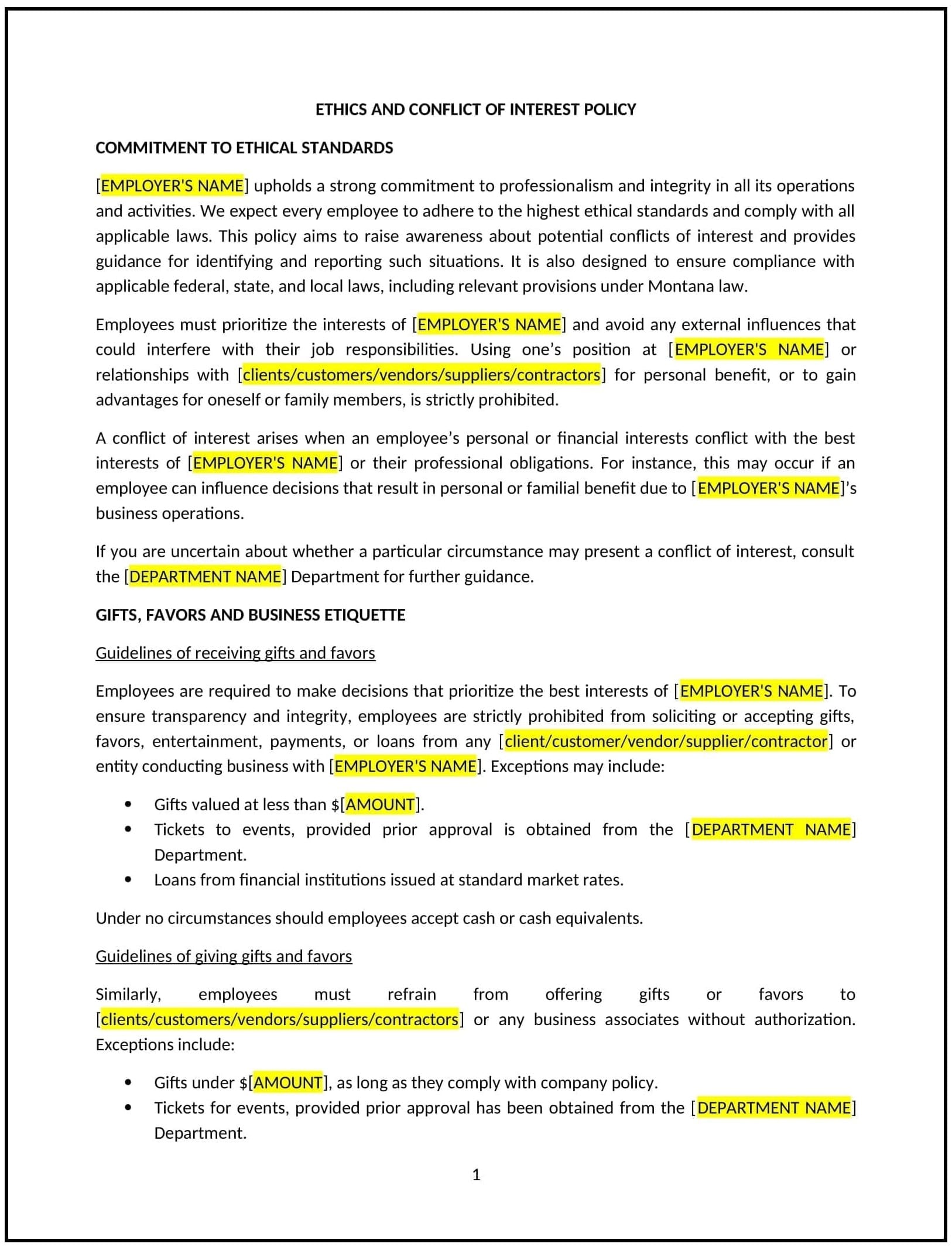Ethics and conflict of interest policy (Montana): Free template
Got contracts to review? While you're here for policies, let Cobrief make contract review effortless—start your free review now.

Customize this template for free
Ethics and conflict of interest policy (Montana)
An ethics and conflict of interest policy helps Montana businesses maintain a culture of integrity, fairness, and transparency by establishing guidelines for ethical conduct and addressing potential conflicts of interest in the workplace. This policy outlines what constitutes unethical behavior, how conflicts of interest should be disclosed, and the steps businesses should take to manage or resolve conflicts.
By implementing this policy, businesses can foster a positive work environment, protect their reputation, and ensure that decisions are made in the best interests of the organization and its stakeholders.
How to use this ethics and conflict of interest policy (Montana)
- Define unethical behavior and conflicts of interest: Businesses should clearly outline what constitutes unethical conduct, including actions like bribery, fraud, or dishonesty, and explain what situations are considered conflicts of interest, such as personal interests that could interfere with business decisions.
- Set disclosure requirements: The policy should require employees to disclose any potential conflicts of interest, including relationships with competitors, suppliers, or customers, or personal financial interests that may affect their job duties.
- Establish procedures for managing conflicts: Businesses should set clear procedures for handling conflicts of interest, such as reviewing the situation with HR or legal teams, implementing necessary safeguards, or reassigning duties to avoid any appearance of bias or favoritism.
- Define consequences for non-disclosure or unethical behavior: The policy should outline the disciplinary actions that may result from failing to disclose conflicts of interest or engaging in unethical behavior, such as warnings, suspension, or termination.
- Provide examples of common conflicts: The policy should provide examples of situations where conflicts of interest may arise, such as hiring family members, accepting gifts from vendors, or making decisions that personally benefit an employee.
- Encourage ethical decision-making: The policy should encourage employees to make decisions based on the company’s best interests, promoting transparency and accountability in all actions.
- Review and update regularly: Businesses should periodically review the policy to ensure it remains relevant, reflects current legal standards, and is effective in addressing potential ethical issues.
Benefits of using this ethics and conflict of interest policy (Montana)
This policy provides several key benefits for Montana businesses:
- Protects business integrity: By addressing conflicts of interest and unethical behavior, businesses can maintain a strong reputation for integrity and trustworthiness, both internally and externally.
- Fosters a positive workplace culture: A clear commitment to ethics and transparency encourages employees to act with honesty and integrity, contributing to a more positive and collaborative work environment.
- Reduces legal risks: A well-defined ethics and conflict of interest policy helps prevent legal issues related to corruption, fraud, or discrimination, ensuring that business operations are conducted within legal and ethical boundaries.
- Improves decision-making: Employees are more likely to make decisions that align with the business’s goals and values when they have a clear understanding of ethical standards and conflict-of-interest guidelines.
- Enhances stakeholder trust: A business that demonstrates a commitment to ethical behavior builds trust with stakeholders, including clients, customers, investors, and regulators.
- Supports long-term success: By prioritizing ethical behavior and managing conflicts of interest, businesses can make sound decisions that contribute to sustainable growth and success.
Tips for using this ethics and conflict of interest policy (Montana)
- Communicate the policy clearly: Ensure all employees understand the ethics and conflict of interest policy, including the types of behavior that are prohibited and the procedures for disclosing conflicts.
- Foster a culture of transparency: Encourage employees to be open about potential conflicts of interest and emphasize the importance of acting in the best interests of the company.
- Provide training on ethical behavior: Regularly train employees on ethical decision-making, conflicts of interest, and how to handle potential issues that may arise in the workplace.
- Enforce the policy consistently: Ensure that the policy is applied consistently across all levels of the organization and that employees are held accountable for ethical violations or failure to disclose conflicts.
- Lead by example: Business leaders should model ethical behavior and decision-making, setting the tone for the rest of the organization.
- Regularly review and update the policy: Periodically assess the effectiveness of the policy, review any changes in laws or regulations, and update the policy as needed to address new ethical concerns.